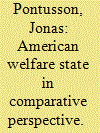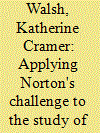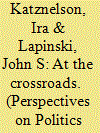|
|
|
Sort Order |
|
|
|
Items / Page
|
|
|
|
|
|
|
| Srl | Item |
| 1 |
ID:
072958


|
|
|
|
|
| Publication |
2006.
|
| Summary/Abstract |
Alberto Alesina and Edward Glaeser's recent book, Fighting Poverty in the US and Europe, exemplifies the recent incursion of economists into the domains of political science and sociology. In thinking about welfare states, economists have traditionally been interested in their effects on the distribution of income and, above all, their implications for efficiency and growth. Alesina and Glaeser instead set out to explain why "Americans are much less willing to redistribute from the rich to the poor than Europeans" (2) or, in other words, why the American welfare state is so small by comparison to European welfare states. This, then, is a book about American exceptionalism in the realm of social policy, but Alesina and Glaeser's discussion also addresses the general problem of accounting for cross-national variation in the public provision of social welfare. Their project is to provide an account of the exceptional nature of the American welfare state that is consistent with and sheds light on differences among other welfare states as well. This makes for an audacious book that deserves critical scrutiny.
|
|
|
|
|
|
|
|
|
|
|
|
|
|
|
|
| 2 |
ID:
072959


|
|
|
|
|
| Publication |
2006.
|
| Summary/Abstract |
In 95 Theses Anne Norton picks a fight with conventional political science. She asks conventional political science to use different measures (indeed, conceptualize what we do as something other than "measuring"), use different methods, and ask different questions. Some may read this as a threat to an entire way of life. I read it as an intriguing and exciting challenge. a
|
|
|
|
|
|
|
|
|
|
|
|
|
|
|
|
| 3 |
ID:
072951


|
|
|
|
|
| Publication |
2006.
|
| Summary/Abstract |
Congress has been situated on the outside edge of the subfield of American Political Development (APD) despite the institution's centrality both to the political history of the United States and to political science as a discipline. Apart from an important but limited number of works-including a long-term research enterprise on the role of sectionalism conducted by Richard Bensel, a study of the antebellum Senate by Elaine Swift, an assessment of the alliance between farmers and workers in the half-century after 1877 by Elizabeth Sanders, a major work on institutional transformations in the House and Senate by Eric Schickler, and a small number of emergent inquiries-"scholars in the American Political Development tradition," as Keith Whittington has noted, "have never fully integrated Congress, as they have other important institutions such as the bureaucracy, the presidency, political parties and the courts."
|
|
|
|
|
|
|
|
|
|
|
|
|
|
|
|
| 4 |
ID:
072957


|
|
|
|
|
| Publication |
2006.
|
| Summary/Abstract |
According to Samuel Huntington, Latin Americans are eroding our country's core Anglo-Protestant values. The values, says he, made America great, unified the country, and allowed immigrant upward mobility through assimilation and acculturation. Huntington expresses concern that immigrants from Latin America, now our main newcomers, along with their U.S.-born progeny, are creating another America, culturally and socially distinct. The reason for this, he claims, is that they settle in close proximity to one another; they retain use of their mother tongue, Spanish; and they remain, in the main, committed Catholics. These conditions purportedly are bad both for America and for the immigrants. They impede new immigrant ability to live the American Dream and, by implication, America's continued global economic preeminence.
|
|
|
|
|
|
|
|
|
|
|
|
|
|
|
|
| 5 |
ID:
072953


|
|
|
| 6 |
ID:
072955


|
|
|
|
|
| Publication |
2006.
|
| Summary/Abstract |
As the United States begins the twenty-first century, it remains the world's leading immigration country. In 2000 (the latest year for which migration data are available on a global basis) the United States was home to almost 35 million legal and unauthorized migrants, or 2.7 times as many as any other country. Although other nations have higher proportions of foreign-born residents (e.g., nearly 25 percent in Australia and 20 percent in Canada), the globally dominant position of the United States in regard to numbers of new immigrants reinforces its self-image as a "nation of immigrants," as does the fact that immigration is generally seen as contributing to the country's economic and demographic strength. However, over the past three decades, more and more new arrivals with non-European origins have come to the country (more than four-fifths are Latino and Asian), many with very low levels of education and illegal status at entry. These changes have fueled public concerns and led to heated debates over whether U.S. admissions and settlement-related policies ought to be modified.
|
|
|
|
|
|
|
|
|
|
|
|
|
|
|
|
|
|
|
|
|